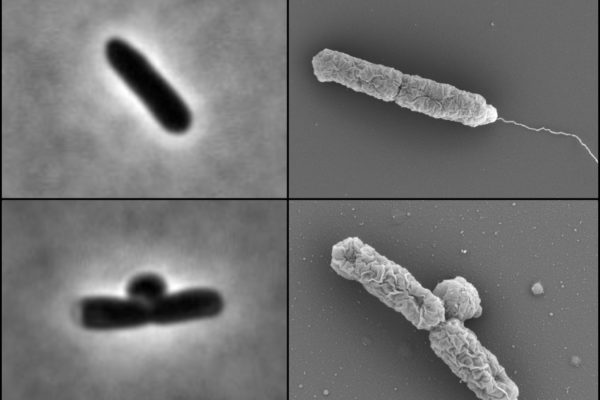Specialist enzymes make E. coli antibiotic resistant at low pH
New research from Arts & Sciences suggests that many “redundant” enzymes are actually specialists that ensure maximal growth across different environments. They also seem to increase resistance to antibiotics in conditions like those in the GI tract or urinary tract — raising concerns that current antibiotic susceptibility tests are inadequate.
Chemical added to consumer products impairs response to antibiotic treatment
A new study led by Petra Levin in Arts & Sciences suggests that triclosan exposure may inadvertently drive bacteria into a state in which they are able to tolerate normally lethal concentrations of antibiotics — including those antibiotics that are commonly used to treat urinary tract infections.
Three faculty members named microbiology fellows
The American Academy of Microbiology has named three Washington University in St. Louis faculty members as fellows: Gautam Dantas, of the School of Medicine, and Robert Kranz and Petra Levin, professors of biology in Arts & Sciences.
Gordon to be honored for microbiome studies
Jeffrey I. Gordon, whose groundbreaking research has linked the trillions of microbes living in the gut to obesity and severe childhood malnutrition, will receive the 2013 Robert Koch Award, the leading international prize in microbiology.
Discovery lets scientists seize controls of South American parasite
Scientists battling Leishmania, a parasite second only to malaria in the number of deaths it causes, have identified an important vulnerability in the genetic code of one major parasite strain.
Family trees of ancient bacteria reveal evolutionary moves
Carrine Blank/WUSTL PhotoA WUSTL scientist suggests that Cyanobacteria arose in freshwater environments rather than in the sea.A geomicrobiologist at Washington University in St. Louis has proposed that evolution is the primary driving force in the early Earth’s development rather than physical processes, such as plate tectonics. Carrine Blank, Ph.D., Washington University assistant professor of geomicrobiology in the Department of Earth & Planetary Sciences in Arts & Sciences, studying Cyanobacteria – bacteria that use light, water, and carbon dioxide to produce oxygen and biomass – has concluded that these species got their start on Earth in freshwater systems on continents and gradually evolved to exist in brackish water environments, then higher salt ones, marine and hyper saline (salt crust) environments.


